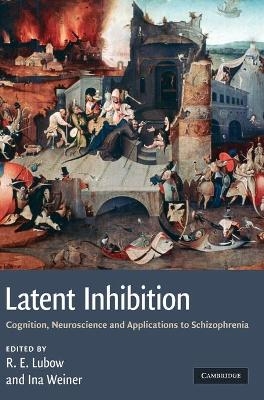
Latent Inhibition
Cambridge University Press (Verlag)
978-0-521-51733-1 (ISBN)
Latent inhibition is a phenomenon by which exposure to an irrelevant stimulus impedes the acquisition or expression of conditioned associations with that stimulus. Latent inhibition, an integral part of the learning process, is observed in many species. This comprehensive collection of studies of latent inhibition, from a variety of disciplines including behavioural/cognitive psychology, neuroscience and genetics, focuses on abnormal latent inhibition effects in schizophrenic patients and schizotypal normals. Amongst other things, the book addresses questions such as, is latent inhibition an acquisition or performance deficit? What is the relationship of latent inhibition to habituation, extinction, and learned irrelevance? Does reduced latent inhibition predict creativity? What are the neural substrates, pharmacology, and genetics of latent inhibition? What do latent inhibition research and theories tell us about schizophrenia? This book provides a single point of reference for neuroscience researchers, graduate students, and professionals, such as psychologists and psychiatrists.
R. E. Lubow was born in the Bronx, New York. He completed his BA at University Heights College of New York University, MS at Washington State University, and PhD at Cornell University. After several years at General Electric in Ithaca, N.Y, where he established their Bionic unit, he received a Career Development Award from the National Institutes of Health (NIH) and moved to North Carolina State University where he continued a basic research program that he had begun as a graduate student with his discovery of the latent inhibition effect. Since 1971, he has been at Tel Aviv University in Israel. His research and theoretical interests focus on normal attentional processes in animal and human learning, and on their disruption as a result of psychopathology, particularly in schizophrenia. He has been the recipient of numerous research grants, and has published over 100 articles and chapters and two books. He is a Fellow of the American Psychological Association and the Association for Psychological Science. Ina Weiner was born in Russia, and at an early age moved with her family to Canada. She completed her BA at York University in Toronto, and soon after immigrated to Israel, where she received her MA and PhD from Tel Aviv University. She has held major grants from a variety of organizations, including the United States-Israel Binational Science Foundation and the Scottish Rite Schizophrenia Research Program. She is one of the leading researchers in the study of the pharmacological and neurophysiological basis of latent inhibition, and in particular its implications for the understanding and treatment of schizophrenia.
Preface R. E. Lubow and Ina Weiner; 1. A short history of latent inhibition research R. E. Lubow; Part I. Behaviour and Cognition: 2. Latent inhibition and extinction: their signature phenomena and the role of error correction R. F. Westbrook and M. E. Bouton; 3. Inter-stage context and time as determinants of latent inhibition G. L. De la Casa and Oskar Pineno; 4. Latent inhibition: acquisition or performance deficit? Martha Escobar and Ralph Miller; 5. Latent inhibition and learned irrelevance in human contingency learning M. E. LePelley and Mia Schmidt-Hansen; 6. Associative and non-associative processes in latent inhibition: an elaboration of the Pearce-Hall model Geoffrey Hall and G. Rodriguez; 7. From latent inhibition to retrospective reevaluation learning: an attentional-associative model Nestor Schmajuk; 8. Latent inhibition and habituation: evaluation of an associative analysis R. C. Honey, M. Iordanova and M. Good; 9. Latent inhibition and creativity Shelley Carson; Part II. Neurobiology: 10. The phylogenetic distribution of latent inhibition R. E. Lubow; 11. The genetic component of latent inhibition: studies of inbred and mutant mice Tatiana Lipina and John Roder; 12. A comparison of mechanisms underlying the CS-US Association and the CS-Nothing Association T. Gould; 13. The pharmacology of latent inhibition and its relevance to schizophrenia Ina Weiner and M. Arad; 14. Parahippocampal region-dopaminergic neuron relationships in latent inhibition A. Louilot, J. Jeanblanc, Y. Peterschmitt and F. Meyer; 15. Latent inhibition and other effects from salience modulation: do they share the same neural substrates? Helen Cassaday and Paul Moran; 16. What the brain teaches us about latent inhibition (LI): the neural substrates of the expression and prevention of LI Ina Weiner; Part III. Latent Inhibition and Schizophrenia: 17. Latent inhibition in schizophrenia and schizotypy: a review of the empirical literature Veena Kumari and Ulrich Ettinger; 18. A cautionary note about latent inhibition in schizophrenia: are we ignoring relevant information? Neil Swerdlow; 19. Latent inhibition as a function of anxiety and stress: implications for schizophrenia Hedva Braunstein-Bercovitz; 20. Nicotinic modulation of attentional deficits in schizophrenia Paul Schnur and Allison Hoffman; 21. Latent inhibition and schizophrenia: the ins and outs of context R. E. Lubow; 22. Summary and conclusions: some unresolved and controversial issues in latent inhibition research and theory R. E. Lubow and Ina Weiner.
| Zusatzinfo | 10 Tables, unspecified; 5 Halftones, unspecified; 46 Line drawings, unspecified |
|---|---|
| Verlagsort | Cambridge |
| Sprache | englisch |
| Maße | 13 x 255 mm |
| Gewicht | 1270 g |
| Themenwelt | Geisteswissenschaften ► Psychologie ► Allgemeine Psychologie |
| Geisteswissenschaften ► Psychologie ► Verhaltenstherapie | |
| Medizin / Pharmazie ► Medizinische Fachgebiete ► Neurologie | |
| Naturwissenschaften ► Biologie ► Humanbiologie | |
| Naturwissenschaften ► Biologie ► Zoologie | |
| ISBN-10 | 0-521-51733-8 / 0521517338 |
| ISBN-13 | 978-0-521-51733-1 / 9780521517331 |
| Zustand | Neuware |
| Informationen gemäß Produktsicherheitsverordnung (GPSR) | |
| Haben Sie eine Frage zum Produkt? |
aus dem Bereich


